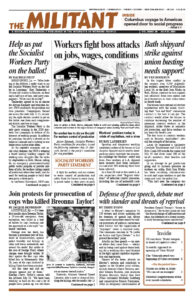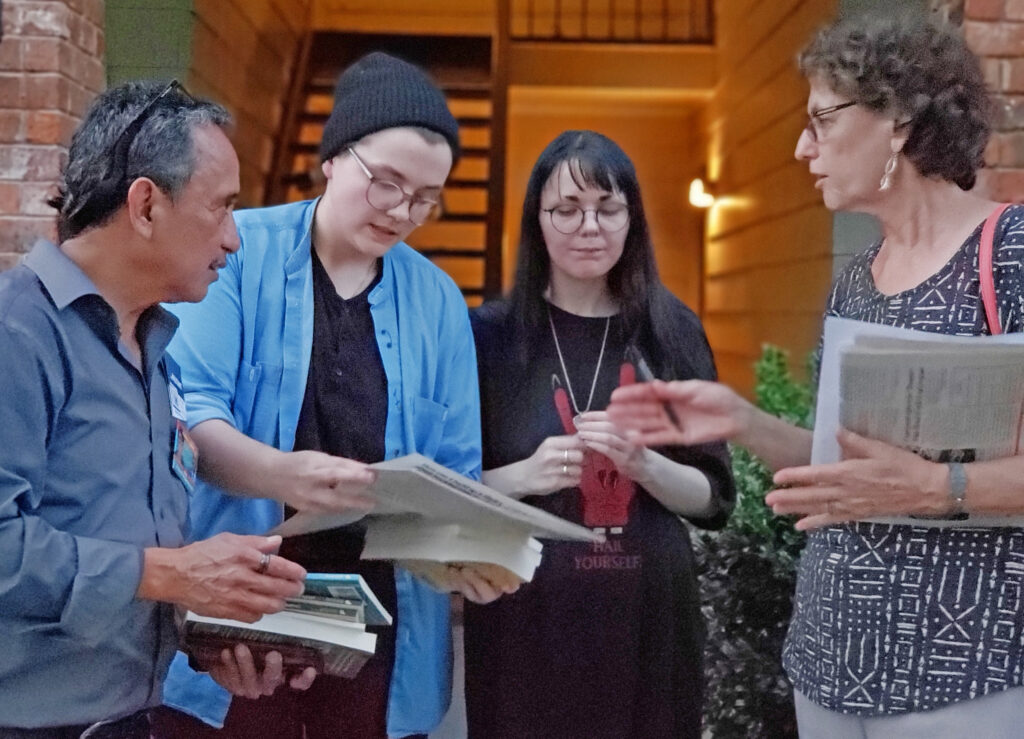SHREVEPORT, La. — “After looking at the Militant, I really want to see the Socialist Workers Party on the ballot in Louisiana,” Keri Tankersley, a 24-year-old student in Monroe, an hour and a half east of here, told party campaigners. “What can I do to help?”
Tankersley agreed to be an elector for Alyson Kennedy and Malcolm Jarrett, SWP candidates for president and vice president. Campaigners fanned out across the state July 11-13, recruiting the eight electors needed to get on the ballot, one from each congressional district and two at-large.
The Socialist Workers Party is the only party running in the 2020 elections that campaigns in defense of the interests of working people. In addition to Louisiana, the party is already on the ballot in Colorado and is fighting to win ballot status in five other states.
As the capitalist economic and social crisis deepens, the SWP is winning a broad hearing building support for working-class struggles like the strike by shipbuilders in Bath, Maine; calling for an emergency government-funded public works program to provide millions of jobs; for workers taking control of production where they work; and the need for working people to build their own party, a labor party.
In southwest Shreveport, SWP campaigners met Kimberly Hatfield and her companion, Rasheed Norman. “Right now, as far as jobs, people need higher wages,” Norman said. “All my friends and family are working for $7.25 an hour, and no one can pay bills on that. I make $100 a day, but it’s hard work in the hot sun all day, doing landscaping.”
“What do you think we should do?” asked Gerardo Sánchez, SWP candidate for U.S. Senate from Texas, campaigning for the presidential ticket.
“We could force them to raise the pay if we all stopped going to work,” Norman said. “If you have a union, you can negotiate schedules, working conditions, and they can’t do whatever they want to you.”
“Even where we don’t yet have a union, workers can unite and act together like a union,” said Sánchez, who works at Walmart, where workers also haven’t yet organized a union.
The 21-year-old Norman, who is Black, said that he has been stopped by cops several times for no reason, leading to a discussion on how to end police brutality.
Tommie McGlothen Jr., a 44-year-old Black man, died after he was beaten by Shreveport police April 5. The beating, captured on cellphone videos by witnesses, was covered up for two months by the cops. McGlothen’s family and the Shreveport NAACP are demanding the firing of all officers involved in his death or the cover-up.
Join fight against cop brutality
Kennedy, Jarrett and SWP candidates across the country have been active in many of today’s fights against police brutality. They explain that protests demanding the prosecution of the cops can push back police violence. But the capitalist rulers will never stop using the cops and their criminal “justice system” to defend their power and profits. To end police brutality, they explain, workers need to fight in their millions to end capitalist rule and bring to power a workers and farmers government.
Sánchez showed Norman The Clintons’ Anti-Working-Class Record by SWP National Secretary Jack Barnes, which details why the prison population saw its biggest growth in U.S. history under the Democratic administration of Bill Clinton. Norman got the book and a subscription to the Militant, and Hatfield signed up to be an elector.
Irina McAllister, a retired worker from New Orleans, also signed up. “The SWP is the only working-class alternative. The party offers a real working-class program that you can read about every week in the Militant newspaper,” she said.
While in New Orleans, Socialist Workers Party campaigners met with a dozen striking sanitation workers and their supporters to extend solidarity and to discuss how to win more support for their fight. Employed by a New Orleans subcontractor, the “hoppers,” as they are called, have been on strike since May 5.
‘Need union to stand up to bosses’
Strike leader Darnell Harris thanked the campaign supporters for coming by to learn more about their fight. “Without a union I don’t see how it’s possible for workers to effectively stand up to the companies,” he said. “We get $10.25 per hour, the minimum in the city. We get no benefits. They had us working for 80 hours per week and we still couldn’t turn overtime down.
“Work clothes? We don’t get any — even though we spend all week throwing garbage in the hot sun,” Harris said. “Work gloves? A few of us who line up extra early might get some cloth garden gloves, if we’re lucky. Sick pay? Don’t even ask. These are some of the reasons why a union matters so much to us.”
Several workers leafed through photos in the book Malcolm X, Black Liberation, and the Road to Workers Power by Barnes, including one of the 1968 Memphis sanitation strike where picketers carried signs saying “I am a man,” a slogan the strikers have put on their picket signs.
The Socialist Workers Party has run a presidential slate in every election since 1948. In Vermont last month, campaigners signed up the electors needed to get on the ballot, after the state government suspended petitioning requirements because their shutdown orders due to coronavirus made them impossible.
Join campaign to put SWP on ballot
In Washington state, the SWP successfully placed Henry Dennison on the ballot for governor after the state waived petitioning and filing fee requirements because of the lockdown there. The campaign and its attorney are urging the state government to do the same for the party’s presidential slate, and is campaigning to tell workers about the party and its fight to get on the ballot.
Government-enforced restrictions imposed under the banner of combating coronavirus have made it virtually impossible to meet petitioning requirements in many other states where the SWP has been on the ballot for decades, including in New Jersey and Minnesota, and in Tennessee, where the party has been on the ballot five times since 1976.
In those states the campaign has retained legal counsel and urged state officials to waive the requirements. It is organizing support from fellow workers, supporters of political rights, anyone who wants to see the working-class alternative on the ballot.
In Washington, D.C., Omari Musa is the Socialist Workers Party candidate for delegate to the House of Representatives. District officials lowered the requirement for ballot status from 3,000 signatures to 250. Campaign supporters had already collected 250 signatures as of July 15, toward their goal of over 500, more than double the requirement. Stepped-up campaigning is set for the weekend of July 18, to complete the drive. Anyone who wants to volunteer can contact the D.C. campaign at (202) 536-5080.
In many states Democratic Party officials are doing anything possible to keep the SWP off the ballot, fearing it could win votes and threaten their party’s chances in 2020. In New York, Gov. Andrew Cuomo issued an executive order significantly raising the number of signatures to put independent parties on the ballot, to 30,000.
Steve Warshell contributed to this article from New Orleans.


